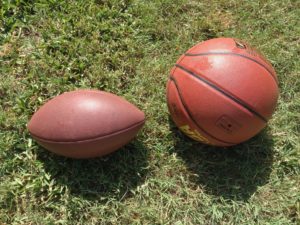 Fall is a critical time for high school football seniors seeking a full athletic scholarship.
Fall is a critical time for high school football seniors seeking a full athletic scholarship.
These athletes must impress both the college scouts and coaches. More importantly, these star athletes must exhibit professional behavior on social media.
Last week, I interviewed Russell Thompson, who has worked as a college scout and was a high school coach for 14 years. Russell is owner and executive producer for an HD video production company.
I enjoyed my visit with Russell as we discussed teen athletes and social media. He offered advice and examples of how colleges and coaches monitor teen athletes, and the importance of good online behavior.
A young athlete can catch the attention of a college scout as young as 12 or 13.
In the industry, being considered by a scout means the student is on the scout’s radar. Not only does the college scout monitor the kids’ skill and talent development; they also monitor their online activity. Russell stated that when he was a scout, he informed players and their parents that he would not tell them when he watched the student play or monitor their social media accounts.
Before the Internet and social media networks, inappropriate behavior by teen athletes was easier to hide. Most of the time coaches and a few select school administrators knew which players needed more “management” or watchful eye to avoid embarrassment for the athlete and school.
Being digital natives, many teen athletes feel invincible on social media and believe college scouts will overlook their inappropriate posts. However, this is an illusion. College football is big money, and most colleges seek to avoid spending resources on social media damage control.
College scouts and coaches may allow students who are under consideration for a scholarship one inappropriate tweet or post. However, coaches and scouts have zero tolerance for underage drinking photos or racial and derogatory comments.
Russell’s advice for his athletes was not to post anything that you could not show or tell your mother. I like his advice better than the grandmother test because most teen athletes have a closer relationship with their parents.
If the teen athlete did not take Russell’s warning seriously, and continued to post inappropriate material the athlete was dropped. Once an athlete has been kicked off of the scout’s radar, there is no way to get back on the radar. Teen athletes do not understand that one wrong tweet will end their career, and scouts will not return their phone calls or respond to emails.
Russell stated “one inappropriate post and you’re done!” There is no room for error on social media if you are highly skilled and talented teen athlete.
Let’s run the math to determine the future value cost of one inappropriate post by a star high school football player, who is being considered by several SEC Conference colleges with the potential to go pro.
A four-year degree at Auburn University for in-state students costs $101,128 and for out-of-state students the cost is considerably more at $167,176.
My undergraduate degree is from Texas A&M University, (whoop!) so for Texas football players a four-year degree will cost $84,204 for in-state students and for out-of-state students the cost is almost double at $150,684.
A teen athlete may think this is no big deal if they lose a scholarship; however, the loss of the future earnings is considerably more than the cost of college tuition.
Graduating from a ranked university still matters as there is credibility associated with the university and the ability to tap an alumni community for employment and networking. If the teen athlete has the ability to go pro the potential earnings can exceed over ten million dollars during their career.
Teen athletes must understand one inappropriate post or tweet can cost them over a million dollars in lost future earnings.
Once the athlete secures an athletic scholarship, they are required to provide the coach and his staff their social media accounts and handle names. Athletes are not required to provide passwords but failure to provide full disclosure of social media accounts can place their scholarship at risk. Most college coaches have one or two dedicated staff members that monitor all the players’ social media activity.
College club sports have similar requirements. Club coaches can kick players off the team for inappropriate online behavior.
Teens were raised on the Internet and use social media networks to visit and connect with friends. I tell teens and parents that privacy is an illusion that anyone can potentially see the information that is posted and shared.
As I mentioned in my book, You Posted What!?, at any point in time non-sensitive information can become sensitive information.
Earlier this month, I visited with Alan Katzman, who founded Social Assurity. His company helps teen athletes work on their social media profile so that it reflects their authentic goals and collegiate interests along with ensuring the content does not contain any inappropriate posts.
Parents and teen athletes must now add social media management to their list of required activities to ensure a successful long-term career.
For teen athletes a 140 characters can make or break their career.